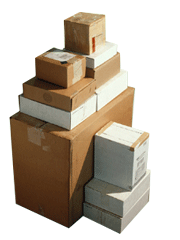shipping instructions 
Enclose a completed
Zoologix submission form with every shipment.
Wait at least one week following the end of antibiotic treatment
before collecting samples.
Swab samples
or
fecal samples
Place each sample in a clean, new, labeled, sealed ziplock bag or plain tube.
Samples in ziplock bags can be sent in an envelope. Tubes, cups or other samples thicker than
6mm (1/4") should be sent in a box, not an envelope,
to prevent crushing and avoid delays.
Ship swabs or
fecal samples at
normal room temperature the same day as collected if possible, to
arrive at Zoologix within 3-4 days. If swabs or feces must be held
for more than a few hours before shipping, refrigerate and ship within a few days, with cold packs.
Don't expose samples to freezing or higher than normal room temperature
in transit; when the weather is very warm please consider shipping by
a more rapid method, and/or adding cold paks.
Most swab materials are
acceptable; plain dry cotton- or synthetic-tip swabs are typical. Any
shaft material is acceptable. The head of the swab should be coated
with sample material to the extent possible, to the amount specified
in the datasheet. We can sometimes test from less
sample material, but too little sample material may result
in decreased test sensitivity, so use the largest swab that
will fit the sample source without harming the patient.
Fecal samples should be at least the volume
indicated in the datasheet, but do not send
excessive volumes per sample.
Blood and
other liquid
samples
Collect fresh whole blood samples in EDTA (purple top) tubes, seal, then immediately invert several times to thoroughly
mix the blood with the preservative material in the tube. Avoid using
heparin (green top) tubes if possible; we can test from heparinized
blood but it is not ideal.
Collect other
liquid samples such as lavage, serum or cerebrospinal fluid in plain tubes or
similar clean, leakproof containers.
Refrigerate liquid samples if shipping will be delayed for more than a few
hours after collection. Room temperature shipping is adequate unless there is a chance
that samples will be in transit for more than ~24 hours or during very
warm weather -- in those cases ship liquid samples with cold packs in an insulated shipping container
to stay cold in transit.
Liquid samples should be shipped in a 3-dimensional package not
subject to crushing in transit - not in an envelope.
For international shipping of liquid samples like blood, cerebrospinal
fluid or semen, ZOOLOGIX can provide dry cards. A small amount of liquid sample is spotted on the
card and dried per instructions printed on the back of each card.
Dry card samples remain stable for months at room temperature, so
handling requirements are less stringent, easing international sample
shipping.
Learn about ordering and
using our dry cards here.
Fresh tissue should be shipped with cold paks in an insulated container to
stay cold in transit.
Fixed or preserved tissue can be shipped at
normal room
temperature.
Frozen
samples
of any kind should be shipped so as to remain frozen until
arrival at Zoologix - typically with dry ice in an insulated container. Follow the carrier's requirements for dry
ice shipments.
Sample
labeling
Uniquely, clearly and permanently label each sample bag, tube, etc. with an
ID of your choice. This ID will identify the sample in the
Results Report. Write all IDs on your submission form too. Each ID
will be handled as a separate sample. Clearly indicate the test(s) or panel(s) you are ordering for
each sample.
Packaging
Enclose
all primary sample containers (tubes, bags, etc.) together inside a
secondary leakproof ziplock bag or other
leakproof container. Protect glass tubes from contact with each other
and pack them so they do not jostle in transit. Enclose enough
absorbent material (batting, paper toweling or similar) inside the secondary
bag or container to fully absorb the total volume of all liquid samples
should a catastrophic spill occur in transit. Use dunnage to prevent movement of contents. Label the outer carton per the
carrier's requirements.
Shipping method
FedEx, UPS, DHL,
or other
similar courier services usually provide the best combination of reliability and cost,
for both domestic and international shipments. Carrier selection is the client's decision and Zoologix receives shipments via all carriers. Customs brokers or freight forwarders are not preferred for shipments to
Zoologix as they often create unnecessary bureaucratic issues which
result in delays and returned shipments.
International shipping permits
Some
sample types from some animal species require special permits for
international shipping. Email Zoologix
your sample details before shipping across borders to request
our import
permits by reply email attachment. Additionally, all primate
samples shipped internationally require a CITES export permit,
obtained by the shipper from the CITES authority in the originating
country. Shipments without all necessary permits will be
rejected, and the shipper will be responsible for any
resulting costs. Do not send shipments without proper permits!
Shipping-related costs
The
shipper is responsible for any fees, customs duty, tax, fine or penalty
related to the shipping of
samples to Zoologix.
Receiving
hours
Zoologix
receives Monday through Friday. If you ship overnight,
select standard mid-morning delivery - do not select
early morning or afternoon delivery.
If you ship on a Friday, designate Monday delivery, not weekend
delivery. Phone or Email Zoologix for advice if you
have a critical weekend requirement.
Send all samples to:
ZOOLOGIX
725 Lakefield Rd,
Suite H
Westlake Village CA 91361
USA
Phone 818-717-8880